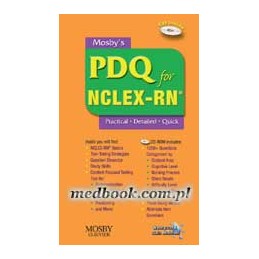Opis
Pocket-sized and easy to use, this study guide to the NCLEX-RN® examination offers valuable test-taking strategies and tools. Its the only portable guide with a Question Dissector that breaks down sample questions to help you find the correct answer, by highlighting key terms and offering helpful hints along with answers and rationales. NCLEX exam-style questions include all types of alternate item formats - such as multiple choice, Select All That Apply, Hot Spots, and Fill in the Blank questions. A mini CD-ROM gives students the opportunity to answer even more practice questions on the computer!
Szczegóły produktu
Indeks
34207
EAN13
9780323054195
ISBN
9780323054195
Opis
Rok wydania
2008
Numer wydania
1
Oprawa
miękka bindowana
Liczba stron
192
Wymiary (mm)
102 x 152
Waga (g)
177
1. NCLEX overview 2. Test taking strategies 3. Implementing the basics 4. Therapeutic communication 5. Management of care 6. Positioning 7. Laboratory values 8. Medication administration 9. Age-related changes (geriatric) 10. Study skills


 Dostawa
Dostawa
 Płatność
Płatność
 Zwroty
Zwroty
